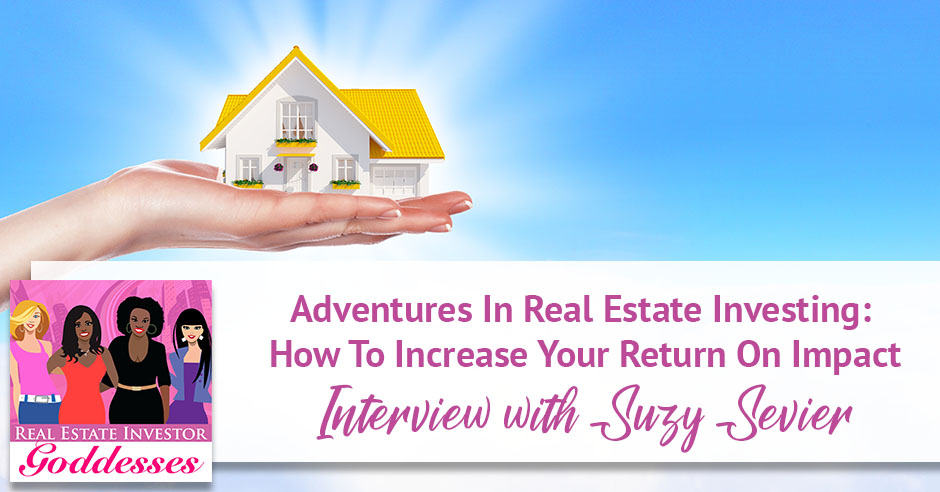
Real estate can be a nerve-wracking experience for newcomers to the space. It can also be full of adventure! Our host, Monick Halm, sits down for a discussion with the co-founder of Adventurous REI, Suzy Sevier. A relative newcomer to the scene, Suzy has already experienced success in the investing space, and today she shares her journey and what she has learned. This is a great episode for newcomers to real estate. Don’t miss it!
—
Watch the episode here:
Listen to the podcast here:
Adventures In Real Estate Investing: How To Increase Your Return On Impact With Suzy Sevier
I am so excited to have Suzy Sevier, the Cofounder of Adventurous Real Estate Investors. Her adventure began at a TEDx event. The theme was Reset and it changed her life in many ways. She took this theme to heart and use that as a launching point to regain control of her life, secure financial freedom, give back to the community and discover her why. She wants to share this journey by helping others achieve their greatest ROI which is a Return On Impact which I love and this is why I’m so focused on women investors because I think that’s what women are about. It’s just not a return on income but a return on impact. I’m super excited to have her. Welcome, Suzy.
Thank you so much for having me on, Monick. I’m excited to share this space with you.
You need to think more outside of the box. You need to see more silver linings. You need to see opportunity in your challenges. Share on XI’m excited to have you especially since you’re a goddess, part of our community. How did you get started in real estate investing? How did you go from this TEDx event to being a real estate investor?
At the TEDx event, the whole theme was Reset. It was a conference for a day that speakers talked about a variety of different topics. I went away from that conference telling myself, “I need to ask more why questions, think more outside of the box, see more silver linings, see challenges as opportunities.” I made sure that that was always in the back of my mind when I was doing something new, doing the same thing or I just thinking about it differently. How I got started in real estate investing was because of COVID-19 and the lockdowns. I live in Cambridge, England with my husband because he’s an active-duty Air Force and he’s getting his PhD at the University of Cambridge. When the first lockdown happened over here, we had no idea how long it was going to last. We were told, “You will no longer be working at your workplace and if you can’t take your work home then you have this break.” He and I looked at each other and we’re like, “What are we going to do?”
We can only leave our house once a day to exercise or go to the grocery store and we don’t have a TV. We decided that we were going to have a mini-book club with each other. One of those books was Multiple Streams of Income. A few chapters in, Robert Allen talks about real estate investing. My husband, Michael, looked at me and like, “Please skip all of the first chapters. Let’s go to the real estate chapter please. We have to do this.” From there, we looked online, listened to podcasts, read books and we found out that the real estate world had gone virtual. In the back of our minds still, the whole Reset TED Talk or TEDx event, we were like, “This is one of the greatest opportunities and we have to try this now. We need to get into the space. That’s how it all started from the seed to now the flower.
You told me that you’d met your husband at this TEDx event. What year was that?
That was 2018.
You’re reading this book and you’re like, “Real estate, I want to do it.” You’re in England and you to start investing in the US. Explain more what happened. What was your first deal and how did you do it?
Immediately, we knew that education was the most important piece. With meetups and everything going virtually, conferences also did. That was a huge contributor which is where I found your conference. It was the first women’s one I went to which was phenomenal in itself. Through those conferences, we learned so much and we went to ten. We didn’t know how long they would stay virtual. We’re like, “If we ever get the opportunity to do them in person, we want to know the ones that are worth going to. We don’t want to hope that the few that we picked virtually work out or the other ones will be good in person. That’s why we chose to go to so many. Through them, we learned so many different bits and I’ll try to bring out the best ones but one that stood out was that you need to almost have an identity shift if you’re going to get into multifamily syndications. What I mean by that is that everybody saw me as getting my MBA, being in accounting, living over here and everybody saw my husband as Air Force.
Through social media, we had to pretty much announced to the world that we were going to start investing in real estate because from there, that’s when people can start to reach out and ask questions. That’s when you almost stopped that limiting belief within yourself because once you announce it and people see it. It’s like, “This is something I’ve now told people that I’m doing. I have to do it.” At least that’s how we felt. That’s how we found our initial boots on the ground because with all the lockdowns, we haven’t been able to travel but we knew that from over here, the biggest missing piece was having somebody in the states. Through the meetups and education, we could learn how to underwrite. You can read and talk to brokers via Zoom on your own. You can do investor relations also via Zoom but something we knew we could not do was go and see the asset. We were going to be extremely uncomfortable if we were submitting LOI’s without having somebody look at the property. That was one huge contributor.
Somebody introduced us to an individual who was investing in our area. That area was chosen again because of the boots on the ground and he ended up being our mentor. He in itself created so much self-confidence. It was an organic mentor who said like, “I see that you guys are showing up in the space often. I would like to be able to help you with this journey.” We were happy. That’s huge in itself because you can give yourself permission to do things so many times but until you take the first leap even submitting that LOI, things are still scary. Having him there to even say like, “You’re fine. This is how it works.” It was like, “Thanks.” It makes you feel so much better. From that whole cumulation of having that self-confidence and boots on the ground, it still came with a lot of being at meetups, being at conferences, spending a lot of time doing real estate activities. It led us to the first deal that we got under contract. That was October of 2020. That was in 88 units in Tulsa, Oklahoma. That was exciting to see and to know that we can do this from anywhere in the world when you have the right team on your side.
Your first real estate deal is 88 units in Tulsa and you had a mentor. Did you partner with this mentor? How did you get this still going?

Adventures In REI: Until you take the first leap, even submitting that LOI is still really scary.
We’re the lead sponsors and we chose that role because we want to continue to do this when we move back. The mentorship relationship was more of a, “We would like guidance.” He has his own team. They’re doing their own pretty big deals. We’re like, “We would like you to come on as guidance because we still want to do this on our own. This is important for us to do.” How that all went was we made it like a cover sheet. It felt like I was asking these brokers to date me but it would be like, “This is our team, our property management company and the lender we’ve been talking to.” We pretty much put it all on there to show that we were serious about doing this.
There are so many first-time investors and only so many brokers. We wanted to show we are serious about doing this even from overseas because that was a huge thing too like, “We’re in Cambridge, England.” We got a lot of, “What?” With that as well, I’m treating the brokers like humans. We would call to chat and see how they were doing. It would be a random text to be like, “What’s up?” A lot of them even said that, “I love American soccer.” I was like, “I have that in common. It’s over here.” That’s something we can talk about. Doing that and if they sent deals, responding and saying like, “We will underwrite this. This is not something we want to pursue at this time.” It’s not like, “I only talk to you when you have a deal like that. I talk to you all the time.” That helped.
Having that property manager already chosen helped as well because that showed that that was something that we were serious about. We also brought on somebody for investor relations to help also with capital raising because as first-time capital raisers, you also have no idea how it’s going to go. That felt the scariest to be honest. Will the people that I’ve been talking to want to invest? The total raised was $1.75 million. I found out right away that it was not going to be my friends and family that were investing with me. It was all brand new. It got to the point where I was doing 20 to 25 investor calls a week to try to make sure that I had that.
A lot of time was spent trying to figure this out. We brought somebody else on for capital raising to make sure that this was something that we could do. He had additional duties, to make that very clear and we also had a KP or Key Principle for the loan to make sure that it could all be covered but that was how the team got brought together. It was through seeing these people in the space over and over creating a relationship. It was not something where it was like, “We’ve met. I like you.” after 30 minutes, “Let’s do this.”
It was like, “I see you often, we chat often, you make me feel comfortable. I’ve asked you why you’ve started investing in real estate. I know your goals.” Not everybody shares all of their goals. “I know enough about you where I’m comfortable investing with you.” That also took patience because with being over here, there was this timer in the back of my mind that I wish I could have gotten to turn off because I didn’t know how long the virtual world would last. Now that I know, it’s here to stay, I’m much more comfortable but with that there’s that sense of urgency. It’s like, “I want to take advantage of Zoom and all of this while it’s still out there.” Now that I do know it’s here, a lot has calmed back there.
There are so many things that people think they can’t accomplish and you were able to accomplish. You started big and put the team together from a different country but it was about building relationships which can happen even from across the miles, across the distance that you can find people and meeting them, cultivating those relationships and putting together your team so you can get the job done. What are you doing now?
We’re doing the traditional asset management. We closed at the end of February 2021. That’s been a whole new adventure in itself because I don’t think that’s something you can truly prepare for because every asset will be so different. Going along that entire journey, we have weekly meetings with our property management company, a lot of discussions are happening because it is so new. Also, we are supposed to close on another 100-unit in Tulsa.
Had you been to Tulsa? What made you choose that market?
We knew that we wanted to base our investment thesis on cashflow. We wanted at least 50% of the returns to come on cashflow. We did not want to bank on the appreciation. We chose that specifically because from us being over here that was already a risk for some individuals. We were trying to mitigate risk because that term means something different to everyone just in different ways. That was one of them. We knew we wanted a Midwest City. Initially, our boots on the ground lives in Oklahoma City. When he had said like, “I’m very interested in multifamily syndications. I would like to chat with you more.” We were like, “Cool.” We Oklahoma City but we love Tulsa. That’s how we moved. There were other cities that we had looked into and thought about but that was what did it. Once we found out he was there, we did it spider web to figure out what worked best and if it would even work best. Tulsa did. We have not been there but from what we’ve looked up and what we’ve been able to find, we liked the numbers but we also liked the feel of Tulsa.
What’s been your biggest mistake? What did you learn from it?
Think deeply about your purpose and your why and your end goal, it can change and that's totally okay. Share on XThe two biggest mistakes that I’ve made, one at the beginning I was thinking that I couldn’t do it from over here. That was a thing in the back of my mind and that’s a huge mistake because if people who are living in Florida are investing in Washington, Montana or wherever that distance, it might not be 4,000 miles but it’s still pretty far. I never needed to put that limiting belief on myself and I don’t know if I did it on my own or if it was also an accumulation of the other people who are like, “Is that something you’re going to try to do?” When I look back on it now, I think to myself, “Why did I give them the power to control my thoughts like that because that’s huge and that’s something that’s unnecessary. That’s important for anyone in the space if you’re new or not. Nobody should have that control over your thoughts and mind because you can do it. You just have to tell yourself that you can do it. If I can do it from a different country, I promise you can do it inside the same country. I do but in regards to real estate investing, our seller also owned the property management company. He was a seller of any of the property management companies under his company as well. I should have thought to look deeper into all of the rent rolls.
It was something that I now have learned from it. I say that because when we closed, the delinquency changed for the next month a lot. With that, I had thought to myself, “I need to do something, I need to dig deeper next time.” I can read so much about how to do due diligence, I can ask so many questions but until you do it over and over, you don’t always know how far you have to dig. Moving forward, I did much deeper and it’s something that I will be more aware of now. I don’t like the term slumlord. That’s something I never ever want to be. Because of that, I hold everybody else at those high standards and I shouldn’t because we are all different humans. Going into my first deal, I was like, “If everyone’s a landlord, we all want to be great people to one another,” and that’s not always true.
It’s the same property so the seller is still the property manager on this property?
No. The seller had his own property management company.
He was managing his own property but he’s not the property manager that you’re currently using. You had a new property manager that you’re working with. You are self-managing but you got the financials and you didn’t look as closely as you should have. That was one. The other one, explain again about the standards and not being a slumlord, I want to make sure I understood that.
For me moving forward when I am a seller I will not put people into our property to fill occupancy and I will not leave the property. I’m not going to stop managing the property because I know that I’m selling it in three months. That’s something I will not do. I say that because when we had talked about the credits for the open units, we were told to pound sand and that in itself was different to hear. The occupancy went 100% and a week after we took over those units had skipped. That doesn’t feel right. I didn’t need the property to be at 100% or you to tell me to pound sand because that was weird to me especially with my husband being in the military and being deployed once.
That’s what I mean by a slumlord. Somebody who stops taking care of a property once it’s about to be sold. Technically he didn’t lie about the occupancy according to the rent roll but it’s weird that the three units that were open were also the three units that had skips with it less than a week when we took over. It’s like, “Yes, I’ve made a story,” but those coincidences are too close for me to see something different.
It’s not uncommon for people to stop the property with tenants to get a deal done because they need a certain amount of stability to ensure it.
To round it out, that was a mistake. What I learned from it was that there are good and bad people no matter what industry you’re in. Asking more questions and digging deeper is not something that should ever look down upon because you’re doing it for the safety of yourself, your investors and everybody else who’s involved. Everybody is important who is part of the deal. It’s not one individual, all of us, all have the same amount of importance.
What are you most proud of?

Adventures In REI: Everybody is important. It’s not just one individual, all of us all have the same amount of importance.
Closing on an 88-unit before I’ve even owned my own personal residence. It’s cool because I thought that millionaires the top 1% owned apartment complexes and that I was never going to be one of those people. Through the determination and telling myself affirmations every single day that I was going to own an apartment unit, it happened. It’s cool that I didn’t have to go through the traditional steps to do that. I didn’t need my own house. I didn’t need to house hack. Everybody’s journey is different and that’s totally okay. I’m proud that I could do that because it felt good inside.
A lot of people think that they have to do real estate, the monopoly game. First, you have to get a little greenhouse and another little greenhouse then you can get a red hotel and it’s possible. You’re such a beautiful example of that. You can start with the red, hotel or big property, you don’t have to start small and it’s not necessarily harder to do that. It’s just different. It’s about being focused and getting it done. You should be very proud. What do you attribute your success to?
It would have to be seeing COVID-19 and the lockdowns as the opportunity instead of as a challenge because I’m a very active human. Once even I was told, “You have to hang out in your flat for who knows how long.” That was difficult. Getting past that. I moved here towards the middle of winter. The light comes up at 8:30 and starts to get dark at 3:30. That’s a new challenge but then I’m in a whole new country and I’m trying to meet people. I’ve met people and COVID happens. New challenge. I’m just wanting to be around people and be active. That can strip a lot away from you because at the same time you’re creating a new identity and learning who you are when you’re no longer in a comfortable space.
Waking up every day and asking myself, “How can I make this day serve me? What can I do to make the best of it?” It was fate for us to read the book. Once it happened, it was like, “This has everything to do with how I will start feeling, the people I’ll be able to see because when you go to meetups, it’s a virtual room but you meet a lot of people.” It was like, “Cool. I can talk to people again.” We all have something in common because this space is amazing. There are a lot of people who were interested in it. I guess these four walls feel different because I’m in them all the time.
What you’re saying reminds me of this quote from Napoleon Hill. It’s something, “Out of every challenge or disappointment is the seed of equal or greater opportunity.” You’ve taken that. A lot of people look at what’s happened with COVID and they’re like, “Why me? It’s Terrible.” Instead, it’s valuable. We’ll go, “Life happens for me, not to me. There are things happening here that will make it the best thing ever.” You embodied that. It’s beautiful. What advice do you have for a woman who’s starting out? You’re pretty new in your game but you’re having a tremendous amount of success.
My advice would be to deeply think about your purpose, why and end goal. It can change and that’s totally okay because we change and grow every day but take a day and think about it, write it down then I would come back to it the next day or a week later. I say that because once you have it written out so many times that you probably haven’t memorized, that will drive you to continue to want to wake up and answer the emails or have called after your traditional 9:00 to 5:00. It will push you through the days where you aren’t feeling so great. Even if you aren’t feeling so great, trust me, you have rest days. I never am saying don’t have them but they push you to do more than you’re used to doing.
Once your passion becomes something larger than yourself at the moment it drives you. That’s what drove me. I had to think about my whys, my passion and who I wanted to be because what you envisioned your life to be gets jumbled up and turned upside down. Once you find out about real estate investing, time freedom and how many people you can impact. It’s a beautiful mess but this mess creates new thoughts. You do have to go through it all over again and decide like, “I am more. I can do more. I want to impact more and this is how I’m going to do it.” That’s truly the best advice that I can give to somebody who’s starting out.
What is the best way for people to connect with you?
I have found out that being a one-stop shop is easy. If you go to AdventurousREI.com/info, you can see the different ways to connect with me. If you’re more comfortable with LinkedIn, website, Facebook or whatever your preferred medium is, you can find it there. I just like to give options because everybody likes different flavors of ice cream.
Time for our trinity, brag, gratitude and desire. What are you celebrating? What’s your brag?
My brag is closing on 100 units here that I’m very excited about. When people say, “It’s the power of the first deal,” I do truly believe part of that. Not only within the people who have been watching but within yourself. You have so much more confidence moving forward to submit more LOI and to talk to more people. That’s what I’m celebrating. The momentum works and it’s there. I promise you guys will feel as wonderful as everybody else does once they close their first deal.
What’s one thing you’re grateful for?
One thing that I am grateful for is now that we do have a little more freedom because of the lockdown, I am going camping and kayaking with my husband. That’s exciting because I want to be outside. I like to be in the fresh air and to be able to close my eyes, sit, hear all of the sounds and take in the wonderful Earth that this is.
The last but not least, what’s one desire?
To impact the people that I’m surrounded by. That might sound broad but I intentionally go into meetings differently now. It’s impacting one person. Even if it’s 1% better every day, that is one thing I desire to do every single day because we were all born to make an impact. I want to make sure that I’m doing that at the smallest level, if anything, to hope to create that ripple effect.

Adventures In REI: You shouldn’t hold everybody else at really high standards because we are all different humans.
Shall your desire be so much better than you can imagine.
Thank you.
You’re welcome. Thank you Suzy for coming and sharing your super inspiring story with us. You can connect with Suzy at AdventurousREI.com/info and connect with me. You can find out about our events like Suzy attended, training programs or our investor clubs to get into passive opportunities like she’s described and to connect to our incredible community of women investors.
Important links:
- Adventurous Real Estate Investors.
- Reset – TEDx Event
- Multiple Streams of Income
- AdventurousREI.com/info
- LinkedIn – Suzy Sevier
- Facebook – Suzy Sevier
About Suzy Sevier
 Suzy Sevier is a Co-Founder of Adventurous Real Estate Investors. Her adventure began at a TEDx event — the theme was Reset — and it changed her life.
Suzy Sevier is a Co-Founder of Adventurous Real Estate Investors. Her adventure began at a TEDx event — the theme was Reset — and it changed her life.
She took the event to heart and used that theme as a launching point to regain control of her life, secure financial freedom, give back to the community, and discover her “why.”
She wants to share this journey by helping others achieve their greatest ROI, Return on Impact.
Love the show? Subscribe, rate, review, and share!
Join the Real Estate Investor Goddesses Community today:





